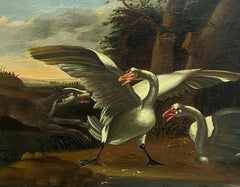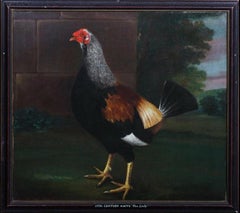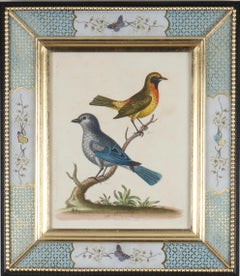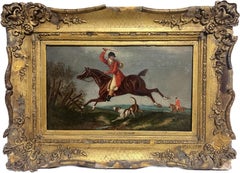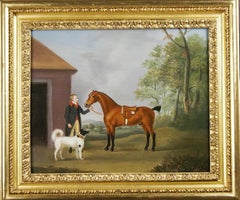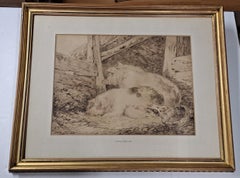18th Century Animal Paintings
1
to
8
74
8
66
1
41
38
1
35
11
14
12
10
Overall Height
to
Overall Width
to
29
36
32
31
16
14
12
11
6
5
4
4
3
3
3
3
2
2
2
2
2
128
799
1,634
5,769
53
33
45
57
64
87
129
106
136
167
82
27
4
3
1
1
82
50
32
16
16
Period: 18th Century
Antique Flemish 18th Century Oil Painting Swans Frightened by Dog in Landscape
Located in Cirencester, Gloucestershire
Swans Startled by Dog
Flemish Old Master, 18th century
oil on bevelled wood panel, framed
framed: 14.5 x 17 inches
panel: 10 x 13 inches
provenance: private collection, UK
condition:...
Category
Old Masters 18th Century Animal Paintings
Materials
Oil
Portrait Of Rooster With Adorned Feathers, Circle Of John Nost Sartorius
Located in Blackwater, GB
Portrait Of A Rooster With Adorned Feathers, 18th Century
Circle of John Nost SARTORIUS (1759-1830)
Large 18th century English study of a rooster in a farmyard, oil on canvas. Supe...
Category
18th Century Animal Paintings
Materials
Canvas, Oil
George Edwards: 18th Century Engravings of Birds
Located in Richmond, GB
George Edwards: ""A History of Uncommon Birds"", 1749-1761.
A prominent English naturalist and ornithologist, George Edwards (1694 -1773) is best known for his work, ""A Natural His...
Category
18th Century Animal Paintings
Materials
Watercolor, Engraving
18th Century English Fox Hunting Oil Painting Wood Panel Gilt Frame
Located in Cirencester, Gloucestershire
Over the Brook (English Fox Hunting scene)
English School, 18th century
circle of John Nost Sartorius (1759-1828)
oil on wood panel, framed
framed:...
Category
Victorian 18th Century Animal Paintings
Materials
Oil
A bay horse with groom and dog
Located in Stoke, Hampshire
Francis Sartorius (1734-1804)
A bay horse with groom and dog
Signed and dated 'F.Sartorius.Pinxt.1788' (lower right)
Oil on canvas
Canvas Size - 14 1/4 x 18 in
Framed Size - 19 1/2 x...
Category
Old Masters 18th Century Animal Paintings
Materials
Oil
George Morland (1763-1804) "Piglets" Watercolor. Original Signed & Dated 1791
Located in San Francisco, CA
George Morland (1763-1804) "Piglets" Watercolor. Original Signed & Dated 1791
Unframed 14" x 18"
Framed 21 x 26
Category
18th Century Animal Paintings
Materials
Watercolor
A horse and groom with a dog
Located in Stoke, Hampshire
Francis Sartorius (1734-1804)
A horse and groom with a dog
signed 'F.Sartorius.Pinxt' (lower right)
Oil on canvas
Canvas Size - 14 1/4 x 18 in
Framed Size - 16 1/2 x 19 1/2 in
Franc...
Category
Old Masters 18th Century Animal Paintings
Materials
Oil
A horse and groom with a dog
Located in Stoke, Hampshire
Francis Sartorius (1734-1804)
A horse and groom with a dog
signed and dated 'F.Sartorius.Pinxt.1777' (lower right)
Oil on canvas
Canvas Size - 14 1/4 x 18 in
Framed Size - 16 1/2 x 1...
Category
Old Masters 18th Century Animal Paintings
Materials
Oil
Gimcrack with jockey up, wearing the colours of 1st Earl Grosvenor
Located in Stoke, Hampshire
John Nost Sartorius (London 1759-1828)
Gimcrack with jockey up, wearing the colours of Richard Grosvenor, 1st Earl Grosvenor
Inscribed and signed 'Gi...
Category
Old Masters 18th Century Animal Paintings
Materials
Oil
Large 18th Century English Sporting Painting Country Squire Hunting Horse & Dogs
Located in Cirencester, Gloucestershire
The Country Squire
English School, 18th century
oil on canvas, unframed
canvas: 36 x 27.5 inches
provenance: private collection, England
condition: large areas of overpainting and re...
Category
English School 18th Century Animal Paintings
Materials
Canvas, Oil
Fine 18th Century Dutch Old Master Oil Painting Cattle & Sheep Ancient Ruins
Located in Cirencester, Gloucestershire
Pastoral Landscape
Dutch Old Master, 18th century
oil on canvas, unframed
canvas: 12 x 10 inches
provenance: private collection, UK
condition: good a...
Category
Old Masters 18th Century Animal Paintings
Materials
Oil
Military Encampment Soldiers on Horseback Dusk Landscape 1700's Oil Painting
Located in Cirencester, Gloucestershire
The Military Encampment
Circle of Carel van Falens (1683-1733, Flemish)
oil on canvas, unframed
canvas: 8 x 10.5 inches
provenance: private collection, UK
condition: very good and so...
Category
Old Masters 18th Century Animal Paintings
Materials
Canvas, Oil
Monumental Singerie 18th Century Whimsical Painting
Located in San Francisco, CA
Monumental Singerie (monkeys imitating human behavior) 18th century whimsical painting in the style of Christopher Huet
In good antique condition with restoration
66"W x 74"H unfra...
Category
18th Century Animal Paintings
Materials
Oil, Canvas
Watson And The Shark, 18th Century JOHN SINGLETON COPLEY (1738-1815)
Located in Blackwater, GB
Watson And The Shark, 18th Century
JOHN SINGLETON COPLEY (1738-1815)
Large 18th Century scene of Watson And The Shark, oil on metal, John Singleton Copley. Excellent quality and co...
Category
18th Century Animal Paintings
Materials
Metal
Study of a hound in a landscape
By Sawrey Gilpin
Located in Stoke, Hampshire
Sawrey Gilpin (1733-1807)
Study of a hound in a landscape
Oil on canvas
Canvas Size - 14 x 17 in
Framed Size - 17 x 20 in
Provenance: Victor Brockbank Fine Art, London;
Private Coll...
Category
Old Masters 18th Century Animal Paintings
Materials
Oil
Herminia and the Shepherds, a painting by Francesco de Mura (Napoli 1696 - 1782)
Located in PARIS, FR
In this masterly painting, Francesco de Mura presents the meeting of Herminia and the shepherds, a famous episode taken from the seventh canto of Torquato Tasso's Jerusalem Delivered...
Category
Old Masters 18th Century Animal Paintings
Materials
Canvas, Oil
18th Century sporting horse portrait oil painting of a race horse and groom
Located in Moreton-In-Marsh, Gloucestershire
Francis Sartorius
British, (1734-1804)
Bay Hunter & Groom
Oil on canvas, signed
Image size: 24.25 inches x 29.25 inches
Size including frame: 32 inches x 37 inches
A wonderful spor...
Category
Old Masters 18th Century Animal Paintings
Materials
Oil, Canvas
A farmstead in a landscape
Located in Stoke, Hampshire
George Morland (1763-1804)
A farmstead in a landscape
Oil on canvas
Signed 'Morland' lower right
Painting Size - 18 1/2 x 24 in
Framed Size - 22 x 28 in
George Morland was born in J...
Category
English School 18th Century Animal Paintings
Materials
Oil
Sir Richard Sutton's foxhounds
Located in Stoke, Hampshire
John Ferneley Snr (1782-1860 Melton Mowbray)
Sir Richard Sutton's foxhounds
signed J. Ferneley lower right
Oil on canvas
Canvas Size 16 1/8 x 20 1/2 in
Framed Size 21 x 25 in
Proven...
Category
Old Masters 18th Century Animal Paintings
Materials
Oil
Rooster and game
Located in Genève, GE
Work on canvas
18th century work
Black wooden frame
55 x 78 x 3 cm
Category
Dutch School 18th Century Animal Paintings
Materials
Oil
19th century English portrait painting of a white poodle dog sitting upright
Located in Bath, Somerset
A white poodle, sitting upright on its hind legs.
Oil on canvas in a giltwood frame, bearing a plaque 'Henry Bernard Chalon 1770-1849'.
Canvas size: 33 x 26cm
In frame: 45 x 37cm
Provenance:
Phillips sale, London, 24 November 1998, lot 140.
David Messum, London
One of the more important painters of his time, Chalon was the son of Jan Chalon, a Dutch musician and engraver from Amsterdam (1749-95), and 'Jackey' Barnard, the daughter of Sir John Barnard, a financier, London merchant, Lord Mayor and M.P. (1722-61). Chalon studied at the Royal Academy schools and married a sister of the artist James Ward. Their daughter Maria A. Chalon became a miniaturist. Chalon became estranged from his wife and James Ward tried, unsuccessfuly, to damage his career.
Chalon had considerable success as a painter and in 1795 was appointed animal painter to the Duchess of York...
Category
English School 18th Century Animal Paintings
Materials
Oil, Canvas
18th century portrait of a Spaniel dog with fruit in a wooded landscape.
By Tobias Stranover
Located in Woodbury, CT
Outstanding early 18th-century portrait of a seated Spaniel dog in a landscape with an array of fruits.
Attributed to the work of Tobias Stranover.
...
Category
Old Masters 18th Century Animal Paintings
Materials
Oil
18th Century English Sporting Art Oil Painting Hunting Scene Riders & Horses
Located in Cirencester, Gloucestershire
English Fox Hunting Scene
English School, 18th century
oil painting on metal, framed
painting size: 15.75 x 19.75 inches
framed: 22 x 26 inches
condition: very good and presentable
p...
Category
English School 18th Century Animal Paintings
Materials
Oil
18th Century oil painting of a grey horse at an encampment, British school
Located in Petworth, West Sussex
Circle of George Morland (British, 1762 – 1804)
A grey horse at an encampment
Oil on board
Indistinctly with signature (lower left)
12.1/8 x 10in. (31 x 40.8 cm.)
Category
English School 18th Century Animal Paintings
Materials
Board, Oil
c. 1800 Shepherd & Milk Maid with Cattle Pastoral Landscape Oil on Wood Panel
Located in Cirencester, Gloucestershire
Pastoral Landscape
by Peter la Cave (fl. 1789-1816)
oil painting on wood panel, framed
framed: 12.5 x 15 inches
panel: 8 x 10 inches
provenance: private ...
Category
Old Masters 18th Century Animal Paintings
Materials
Oil, Wood Panel
A German Pointer with hunting Equipment
Located in Stoke, Hampshire
German School (18th century)
A German Pointer with hunting Equipment
Oil on canvas
Canvas Size 42 x 35 in
Framed Size 48 x 41 in
Category
Old Masters 18th Century Animal Paintings
Materials
Oil
The Fox Hunting Party, dated 1770 John Nost SARTORIUS (1759-1828)
By John Nott Sartorius SNR
Located in Blackwater, GB
The Fox Hunting Party, dated 1770
John Nost SARTORIUS (1759-1828) - names of the hunting party fully inscribed by the artist verso
Large 18th Century English Fox Hunting Party land...
Category
18th Century Animal Paintings
Materials
Oil, Canvas
18th Oil Painting Horses Feeding at the Stables
Located in London, GB
James Seymour (1702–1752)
Feeding Time in the Stables
Oil on canvas
32 x 38 inches inc. frame
Provenance: Private Collection, Lambourn
James Seymour (1702–1752) was an English painter, widely recognized for his equestrian art.
Seymour was born in London. His father was an amateur artist and art dealer, whose other business dealings (as a banker, goldsmith, and diamond merchant) afforded young Seymour the leisure time to study art on his own, either his father's or the art at the Virtuosi Club of St. Luke - a gentleman's club his father belonged to, specializing in art. In a short time the boy was a self-taught artist, familiar with many of the prominent artists of the period.
Seymour's love of art was matched only by his love of horses. He began spending time at racetracks early on, and before long found himself absorbed in the sport - drawing, painting, owning, breeding, and racing horses. His art proved popular among the prominent sporting families of the day, eventually garnering Seymour patrons in Sir William Jolliffe and Charles Seymour, 6th Duke of Somerset...
Category
Old Masters 18th Century Animal Paintings
Materials
Oil
1700's Venetian Old Master Ink Drawing St. Marks Lion Angelic Figures Flowers
Located in Cirencester, Gloucestershire
The Lion of St. Mark
Venetian Old Master, mid 18th century
circle of Giovanni Battista Tiepolo (Venetian, 1696-1770)
ink and watercolour drawing on paper mounted on a card frame, unf...
Category
Rococo 18th Century Animal Paintings
Materials
Ink, Watercolor
The Infant St John the Baptist with Lamb - Italian Old Master art oil painting
Located in London, GB
This beautiful 18th century Italian Old Master oil painting is something rather special. Painted circa 1750 the subject matter is Saint John the Baptist as a very young child. He is ...
Category
Old Masters 18th Century Animal Paintings
Materials
Oil
Table Top Still Life with Birds, Fruit and Walnuts - Old Master art oil painting
Located in London, GB
This simply stunning German 18th century Old Master oil painting is by noted artist C.L. Braun, signed lower right on the table edge. It was painted circa 1780 and has the look of a...
Category
Old Masters 18th Century Animal Paintings
Materials
Oil
Early Naturalistic Wildlife Animal Rendering of a Possible Capuchin Monkey
Located in Houston, TX
Early naturalistic wildlife rendering by the English artist Peter Paillou. The work features a delicately rendered depiction of a possible capuchin monkey from an 18th century specim...
Category
Naturalistic 18th Century Animal Paintings
Materials
Gouache
Pastoral Scene with Shepherd and Animals - Old Master c 1700 art oil painting
By Philipp Peter Roos (Rosa di Tivoli)
Located in London, GB
This superb Old Master later 17th/early 18th century oil painting is attributed to Baroque painter and German born animal artist Philipp Peter Roos. He was active in and near Rome fr...
Category
Old Masters 18th Century Animal Paintings
Materials
Oil
Caravan of shepherds Oil on canvas painting Giuseppe Tassone
Located in Milan, IT
Giuseppe Tassone (Rome 1653 - Naples 1737)
Shepherd's Caravan
Oil on canvas, 130 x 155 cm
Expert opinion Prof. Alberto Crispo
The manner of outlining the people and animals with...
Category
18th Century Animal Paintings
Materials
Canvas, Paint, Oil
Antique oil painting, Boy Fleaing a Dog, Gerard ter Borch, Dutch golden age
Located in DEVENTER, NL
Gerard ter Borch (II) (1617-1681), copy after, around 1700
'Boy Fleaing a Dog'
Oil on canvas
Professionally restored (cleaned and relined)
In modern frame in 17th century style
Dimensions excl. frame: 33 x 27,5 cm.
Dimensions incl. frame: approx. 50 x 45,5 cm.
Depcited is a boy busy fleaing a dog. The boy sits on a chair with the dog on his lap. On a table on the right there is a book and a pen. On a wooden bench lies the boy's hat.
What is unique about this painting by Ter Borch, is the relationship that is depicted between human and animal. Mostly animals like dogs where depicted as an attribute in paintings in the 17th century, and sometimes used to symbolize certain character traits. This boy is lovingly caring for his dog, which he is giving his full attention.
Another interesting detail is that Ter Borch's brother Moses, was probably the model for this painting. Ter borch often used family members as models for his paintings. Moses was also a very talented painter and draughtsman.
Several copies of this work by Ter Borch are known. One of these copies is in the collection of the Dutch Rijksmuseum (Image included in the image gallery (last image)).
The original painting is in the collection of the Alte Pinakothek museum in Munich, Germany.
Gerard ter Borch, also known as Gerard Terburg, was a Dutch genre painter who lived in the Dutch Golden Age. He influenced fellow Dutch painters Gabriel Metsu...
Category
Old Masters 18th Century Animal Paintings
Materials
Oil, Canvas
A large English 18th century painting of a Chestnut horse
By Thomas Beach
Located in Bath, Somerset
A saddled chestnut hunter tethered to a post at the entrance to stables with a wooded landscape and a hill beyond. Signed and dated lower left, 'T. Beach pt., 1785'.
Provenance:
Anonymous sale, London, Christie's 28 May 1999. lot 15
Thomas Beach was essentially known as a portrait artist and the present painting is a rare example of his skill as an animal painter. His ability to convey a sense of the character of his sitters is evident here in the remarkably sensitive portrayal of the horse's expression.
Beach painted...
Category
English School 18th Century Animal Paintings
Materials
Canvas, Oil
Fine 18th Century Old Master Oil Painting Dead Game in Landscape
Located in Cirencester, Gloucestershire
Still Life with Dead Birds
18th Century Italian School
oil painting on canvas, framed
framed: 16 x 20 inches
canvas: 13 x 17 inches
provenance: privat...
Category
Old Masters 18th Century Animal Paintings
Materials
Oil
Animal scene Duck hunting with dogs 18th century Swedish Master by Philip Korn
Located in Stockholm, SE
Monogrammed lower left: Johan Philip Korn (1728 - 1796), was a Swedish painter. A beautiful landscape, with a backwater in which carefree ducks swim, hunters and their dogs in passion, in the background you can see a city with a bell tower. Old masters have been depicting animals in their paintings since the Renaissance. In those days, hunting scenes were popular - there is always a share of emotional participation in them. Here it is necessary to understand that in previous centuries people looked at hunting as a means of obtaining food, therefore naturalism dominates in the painting of the old masters. Old oil painting on wooden panel, in a non-original frame of the 19th century.
Size app.: 49 x 64 cm (roughly 19.3 x 25.2 in) and nice golden gesso frame ca 65.5 x 81.5 cm (roughly 25.8 x 32.1 in). Very Good condition, age wear, cracks on a wooden board, minor losses, retouches, cleared and conserved. Please study good resolution images for overall cosmetic condition. In person actual painting may appear darker or brighter than in our pictures, strictly depending on sufficient light in your environment. Weight of app. 6.4 kg is going to measure some 10 kg volume weight packed for shipment.
Johan Philip Korn first began his career as a decorative painter. He was a student of artist Johan Sevenbom (1721-1784). After further studies he changed to landscape painting in the Rococo style of French artist François Boucher (1703–1770) and often after Dutch copper engravings. In 1759, Korn became master of the Stockholm...
Category
Realist 18th Century Animal Paintings
Materials
Wood, Oil
Children w Lamb Scene 18th century Oil painting by French Rococo Master
By Jean Baptist Marie Huet
Located in Stockholm, SE
Painting was attributed to Jean-Baptiste Marie Huet (1745 - 1811) by Cabinet Turquin (France). A cute scene with children tying a ribbon around the neck of a young lamb. Rococo in th...
Category
Rococo 18th Century Animal Paintings
Materials
Canvas, Wood, Oil
A Dog with Dead Game
By Jan Weenix
Located in St. Albans, GB
Jan Weenix
Canvas Size: 32 x 26" (82 x 66cm)
Outside Frame Size: 40 x 34" (102 x 86cm)
This beautiful painting is unsigned but this is not unusual with Jan ...
Category
Italian School 18th Century Animal Paintings
Materials
Oil
Fine 18th Century Old Master Oil Painting Dead Game in Landscape
Located in Cirencester, Gloucestershire
Still Life with Dead Birds
18th Century Italian School
oil painting on canvas, framed
framed: 17 x 21 inches
canvas: 14 x 18 inches
provenance: private collec...
Category
Old Masters 18th Century Animal Paintings
Materials
Oil
George Edwards: 18th Century Engravings of Birds
Located in Richmond, GB
George Edwards: ""A History of Uncommon Birds"", 1749-1761.
A prominent English naturalist and ornithologist, George Edwards (1694 -1773) is best known for his work, ""A Natural His...
Category
18th Century Animal Paintings
Materials
Watercolor, Engraving
George Edwards: 18th Century Engravings of Birds
Located in Richmond, GB
George Edwards: ""A History of Uncommon Birds"", 1749-1761.
A prominent English naturalist and ornithologist, George Edwards (1694 -1773) is best known for his work, ""A Natural His...
Category
18th Century Animal Paintings
Materials
Watercolor, Engraving
A dark bay racehorse held by his trainer at Newmarket Heath
Located in Stoke, Hampshire
Benjamin Killingbeck (act. 1769-1783)
A dark bay racehorse held by his trainer on a racecourse
Oil on canvas
Canvas Size - 40 x 50 in
Framed Size ...
Category
Old Masters 18th Century Animal Paintings
Materials
Oil
Portrait of Julien Prieur as a hunter - Circle of Jean-Baptiste Oudry 1686-1755
By Jean-Baptiste Oudry
Located in PARIS, FR
This portrait depicts us the trusted confidant of the Conflans d'Armentières family. More precisely, Julien Prieur was the fiscal procurator of the Marquisate of Armentières, playing the role of representative of the "public ministry", safeguarding the interests of his lord. His role, one can imagine, was crucial at the death of Michel de Conflans (in 1717) since the latter left an heir, Louis, aged only 6, and a widow, Diane Gabrielle de Jussac, whom some memoirs describe as "a very clever grande dame" . Prieur ensured the smooth running of the family's affairs and it is probably to thank him for his services that Diane Gabrielle had his portrait painted, most probably by a painter close to Jean-Baptiste Oudry.
Julien Prieur appears as he is, middle-aged, with a benevolent look, in his hunting suit. Only his knotted wig links him to the nobility.
Above all, he is depicted as a hunter, a passion that he shared with the Marquis of Armentières. His very young master, Louis, became a first-rate hunter, hunting in the King's entourage, in whose cabinet he died of apoplexy in January 1774. As for the his son, he was one of Louis XVI's closest hunting companions, as numerous souvenirs attest .
1. Some biographical information about the model and the commissioner
While the identity of many 18th century portraits is uncertain, an old label stuck on the reverse of the canvas gives us some precise information on the identity of the model: "Mr. Julien Prieur, homme d’affaires de Mr. le Marquis d'Armentières - Commune of Brécy - Aisne". The label also suggests that it could be his son Louis Prieur living in Rocourt (probably Rocourt-Saint-Martin, a neighbouring municipality of Brécy), born on 30 September 1745, who died on 8 July 1826, but this hypothesis must be rejected in view of the model's clothing. This label probably gives us an indication on the previous owner the owner of this painting; we will see later why it seems likely that this label was affixed between 1826 and 1832.
Brécy is now a municipality in the Aisne County (Hauts-de-France) located between Soissons and Château-Thierry, slightly north of the Paris-Reims axis. It borders the municipalities of Armentières-sur-Ourcq and Rocourt-Saint-Martin. According to Louis Prieur's death certificate, he was in fact born in 1743 and not in 1745 . The age of the model in the painting and the dating of this painting would indicate that Julien Prieur, was probably born at the very end of the 17th century.
In Louise-Marthe de Conflans-Coigny, chatelaine de Brécy , we read that "the Conflans were a family of ancient nobility, which genealogists trace back to the 12th century, when it was said to have come from the house of Brienne. In the 16th and 17th centuries, this family had several illustrations in the profession of arms. [...] Michel de Conflans, [...] belonged to a younger branch of the family, of which Saint-Simon wrote, with his acid soaked pen, that "poor and obscure, they had never left their village, where their house resembled a hut" and elsewhere that they "lived on their rifles and cabbages".
Fortunately for Michel de Conflans, the last representative of the elder branch, Henriette d'Armentières, made him her heir on her death in 1712. It was through her that the land of Armentières and its 14th century castle became part of the estate of this branch, as well as, not far from there, the land of Brécy and the castle of Le Buisson, where the family lived. In the early years of the 18th century, Michel de Conflans was able to push himself into the entourage of the Duke of Orleans, becoming his first gentleman of the chamber. However it was above all his son Louis who restored the family status through his military career.
Born on 23 February 1711, Louis de Conflans, Marquis d'Armentières died of apoplexy on 18 January 1774, in the King's cabinet at Versailles. Appointed lieutenant general in 1746, he received his Marshal of France’s stick in 1768. The Dictionary of French Biography writes of him that "without ever achieving a high command, he appeared with honour in all the wars of his time".
The estates of Armentières and Le Buisson were sequestered during the French Revolution, declared national property and sold at auction (in 1794 and 1795 respectively) after the Marquise d'Armentières, the Marshal's second wife, was beheaded in 1794.
The Château du Buisson (where Michel de Conflans died in 1717) was bought by a granddaughter of the Marshal de Conflans, the Marquise de Coigny, in 1816 and remained in her family after her death in 1832 until the sale of the 1,054 hectares estate in 1866.
The bayonet blows that probably pierced the canvas in three places may well have a revolutionary origin and it is conceivable that the painting, acquired by the Marquise de Coigny from Louis Prieur, Julien's son, after the latter's death, was then restored and given the label specifying the name of the model.
2. Description of the portrait
The painting presents a man in his thirties in his hunting costume. Pictured at mid-body, his face is marked by his life in the open air and characterised by a look of great bonhomie. Holding a rifle under his elbow, he is soberly dressed in a large caramel-coloured jacket, decorated with silver buttons. Presented in a three-quarter view, the model holds a partridge in his right hand. The jacket opens onto a vermilion waistcoat. A green shoulder strap probably holds a powder flask hidden under his arm while a satchel is visible on his belt.
The model is wearing a grey wig, tied at the back with a black ribbon that seems to fly in the wind. This ornament anchors Julien Prieur in his time. "The new King of France, Louis XV, [imposed] a style of smaller wigs for men and the rigorous white or preferably greyish powdering. From the middle of the century men also used a ponytail on the back of the neck, tied with a ribbon, a style that became very popular in all courts."
He stands out against a dark, purplish sky at the end of an autumn day in a soberly sketched forest landscape. The treatment of the sky recalls the influence of Largillière, Oudry's first master.
3. Jean-Baptiste Oudry
Jean-Baptiste Oudry was born on 17 March 1686 in Paris, rue de la Ferronnerie. He began his apprenticeship around 1705-1707 with Nicolas de Largillière, with whom he stayed for five years.
In 1713 Oudry established his "livre de raison" in which he reproduced all his early works in wash drawings up until 1718. During this first period which lasted about 7 years, Oudry produced works of great diversity, both in the genres that the artist tackled and in the artists which influenced him. It has been estimated that he painted about 150 pictures during this period: mainly portraits, but also still lifes and some religious paintings and landscapes.
Of the hundred or so portraits that Oudry is said to have painted during this period, only fifteen have been identified today. A number of those lost portraits are probably still confused with works by Largillière.
First admitted to the Académie de Saint-Luc in 1708, he was then allowed to join the Académie Royale in 1717, and subsequently admitted as a history painter in 1719. This year marks a turning point from which Oudry will assert himself as an animal painter. In 1723 he met Louis Fagon, Intendant of Finances, and the Marquis de Beringhen, the King's first equerry, who became both friends and patrons of the artist, giving him access to royal commissions and enabling him to be appointed as painter of the Royal Tapestry Factory of Beauvais in 1726.
From 1728 onwards, the creation of tapestries became the core of his work, even though at the same time Oudry developed his skill as an illustrator, first for Scarron's Roman Comique and then for La Fontaine’s Fables.
Between 1726 and 1731, Oudry created the decoration of a large drawing room at the château de Condé-en-Brie, about twenty kilometres from Brécy, which has remained in place to this day. This important commission, about which few details are known, is said to have originated with the Countess de Verrüe, a great lady of the French Regency who often stayed at Condé with her friend Jean-François Leriget, Marquis de la Faye, then owner of Condé.
A prolific artist, Oudry fulfilled numerous commissions in parallel with his regular contributions to the Salons, to which he regularly took part until 1753. He suffered a stroke in 1754 and died the following year.
It seems almost certain, in view of the importance of his work, that Oudry supervised a workshop in which several artists were involved, but this point is very poorly documented. Given the geographical proximity of Brécy and Condé-en-Brie, the links between the Armentières family and the Condé patrons, and finally based upon the quality of our portrait, we propose the hypothesis that it was painted by one of the painters who worked with Oudry at Condé.
4. Related artworks: comparison with some other portraits of hunters by Jean-Baptiste Oudry
While Oudry gradually abandoned portraiture from 1720 onwards to devote himself to animal paintings, he seems to have made an exception for hunter portraits, which were often depicted in the company of their hunting dogs. Two examples seem particularly evocative and suggest a dating for our painting around 1730. We will see in a second part why this dating proposal seems relevant.
The first portrait worth mentioning is the presumed portrait of Lieutenant Claude-André Courtin de Crouey, lord of Quatre Fils and Cormeilles-en-Parisis made in 1723, reproduced below. Also presented in a very tight frame, it is interesting for the similarities in the representation of the rifle, and in particular the two metal rivets that are almost identical in our painting.
The painting that seems closest to ours is the presumed portrait of Monsieur...
Category
Old Masters 18th Century Animal Paintings
Materials
Canvas, Oil
George Edwards: 18th Century Engravings of Ducks And Wading Birds
Located in Richmond, GB
George Edwards: ""A History of Uncommon Birds"", 1749-1761.
A prominent English naturalist and ornithologist, George Edwards (1694 -1773) is best known for his work, ""A Natural His...
Category
18th Century Animal Paintings
Materials
Watercolor
George Edwards: 18th Century Engravings of Birds
Located in Richmond, GB
George Edwards: ""A History of Uncommon Birds"", 1749-1761.
A prominent English naturalist and ornithologist, George Edwards (1694 -1773) is best known for his work, ""A Natural His...
Category
18th Century Animal Paintings
Materials
Watercolor, Engraving
George Edwards: 18th Century Engravings of Ducks And Wading Birds
Located in Richmond, GB
George Edwards: ""A History of Uncommon Birds"", 1749-1761.
A prominent English naturalist and ornithologist, George Edwards (1694 -1773) is best known for his work, ""A Natural His...
Category
18th Century Animal Paintings
Materials
Watercolor
George Edwards: 18th Century Engravings of Birds
Located in Richmond, GB
George Edwards: ""A History of Uncommon Birds"", 1749-1761.
A prominent English naturalist and ornithologist, George Edwards (1694 -1773) is best known for his work, ""A Natural His...
Category
18th Century Animal Paintings
Materials
Watercolor, Engraving
George Edwards: 18th Century Engravings of Birds
Located in Richmond, GB
George Edwards: ""A History of Uncommon Birds"", 1749-1761.
A prominent English naturalist and ornithologist, George Edwards (1694 -1773) is best known for his work, ""A Natural His...
Category
18th Century Animal Paintings
Materials
Watercolor, Engraving
Fine 1700's Italian Old Master Oil Painting Hunting Dogs with Game, Roman Ruins
Located in Cirencester, Gloucestershire
Artist/ School: Italian School, early 18th century
The painting is almost certainly from the circle of the Italian Baroque painter known as 'Rosa da Napoli', Jacob Roos (Rome 1682-Na...
Category
Baroque 18th Century Animal Paintings
Materials
Oil
George Edwards: 18th Century Engravings of Ducks And Wading Birds
Located in Richmond, GB
George Edwards: ""A History of Uncommon Birds"", 1749-1761.
A prominent English naturalist and ornithologist, George Edwards (1694 -1773) is best known for his work, ""A Natural His...
Category
18th Century Animal Paintings
Materials
Watercolor
George Edwards : A Set of Twelve 18th Century Etchings of Hummingbirds
Located in Richmond, GB
George Edwards: ""A History of Uncommon Birds"", 1749-1761.
A prominent English naturalist and ornithologist, George Edwards (1694 -1773) is best known for his work, ""A Natural His...
Category
18th Century Animal Paintings
Materials
Watercolor, Etching
George Edwards: 18th Century Engravings of Birds
Located in Richmond, GB
George Edwards: ""A History of Uncommon Birds"", 1749-1761.
A prominent English naturalist and ornithologist, George Edwards (1694 -1773) is best known for his work, ""A Natural His...
Category
18th Century Animal Paintings
Materials
Watercolor, Engraving
Set of Twelve 18th Century Engravings of Birds
Located in Richmond, GB
George Edwards: ""A History of Uncommon Birds"", 1749-1761.
A prominent English naturalist and ornithologist, George Edwards (1694 -1773) is best known for his work, ""A Natural His...
Category
18th Century Animal Paintings
Materials
Watercolor, Engraving
George Edwards: 18th Century Engravings of Ducks And Wading Birds
Located in Richmond, GB
George Edwards: ""A History of Uncommon Birds"", 1749-1761.
A prominent English naturalist and ornithologist, George Edwards (1694 -1773) is best known for his work, ""A Natural His...
Category
18th Century Animal Paintings
Materials
Watercolor
George Edwards: 18th Century Engravings of Ducks And Wading Birds
Located in Richmond, GB
George Edwards: ""A History of Uncommon Birds"", 1749-1761.
A prominent English naturalist and ornithologist, George Edwards (1694 -1773) is best known for his work, ""A Natural His...
Category
18th Century Animal Paintings
Materials
Watercolor
18th century English portrait of the Duke of Newcastle upon his horse in
By Thomas Spencer
Located in Woodbury, CT
Thomas Spencer was a leading sporting and equestrian artist of the period of John Wootton and James Seymour; his art shows a considerable to debt to tha...
Category
Old Masters 18th Century Animal Paintings
Materials
Canvas, Oil
